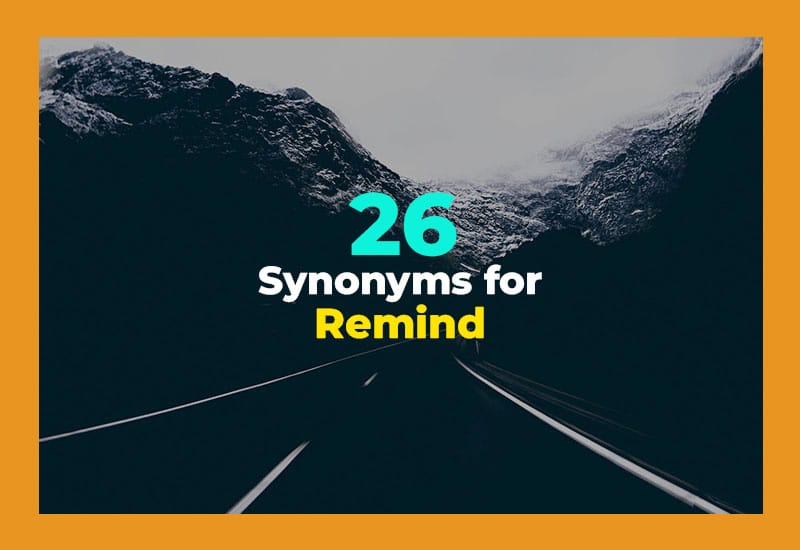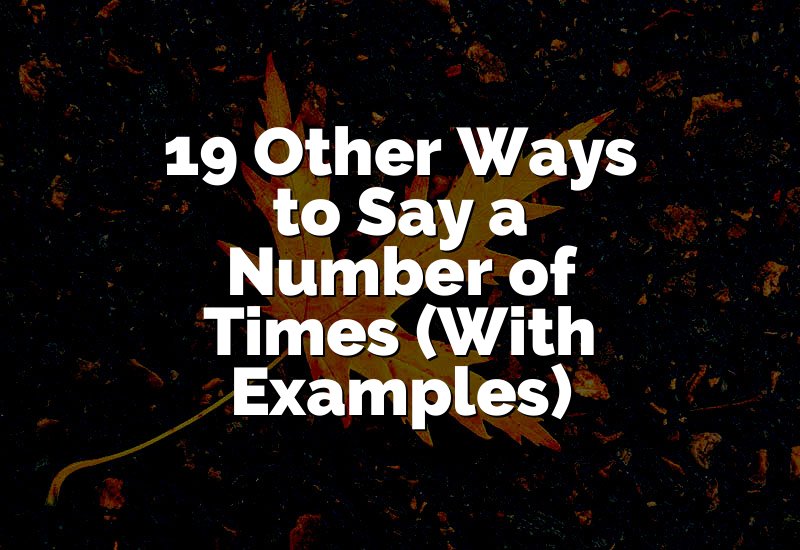You know that moment when you need to tell someone not to forget something? Most of the time, you say “remind.” But guess what? There are so many other ways to say it. In this article, we will explore best alternatives like “prompt,” “nudge,” or even “recall.” You’ll get meanings and examples that feel amazing and helpful for daily use.
| Synonym | Meaning | Example |
|---|---|---|
| Prompt | To encourage someone to take action | She prompted me to call my doctor. |
| Nudge | To gently push someone to remember | He nudged me about the meeting tomorrow. |
| Recall | To bring something back to mind | I recall the day we first met. |
| Refresh | To help bring back memory | Can you refresh my memory of her name? |
| Cue | A signal that makes someone remember | The bell was a cue to leave the class. |
| Warn | To let someone know ahead of time | She warned me about the deadline tomorrow. |
| Alert | To draw someone’s attention | He alerted me about the traffic jam. |
| Signal | To show or indicate something | The teacher signaled us to be quiet. |
| Advise | To give helpful notice or suggestion | She advised me to set a reminder. |
| Encourage | To support someone in remembering | They encouraged me to check my list twice. |
| Motivate | To push someone to take action | His speech motivated me to finish my work. |
| Notify | To inform someone formally | I was notified about the upcoming event. |
| Announce | To make something known out loud | They announced the time of the meeting. |
| Suggest | To put forward an idea | He suggested I write things down. |
| Recommend | To advise as a good choice | She recommended using an app to track tasks. |
| Mention | To bring up casually | He mentioned the deadline again. |
| Bring up | To raise a topic or memory | She brought up our travel plans. |
| Point out | To direct someone’s attention | He pointed out that the form was due. |
| Indicate | To show or suggest clearly | The sign indicated we should turn left. |
| Highlight | To draw strong attention | She highlighted the key dates on the board. |
| Emphasize | To stress something important | He emphasized the need to start early. |
| Forewarn | To tell someone before something happens | She forewarned me about the late bus. |
| Inspire | To make someone want to act | His talk inspired me to get organized. |
| Motivate | To give a reason to act | The coach motivated us to practice harder. |
| Urge | To strongly encourage | He urged me not to skip the meeting. |
| Promptly ask | To quickly encourage to act | She promptly asked me to check again. |
Prompt
When you want someone to take quick action, you can use “prompt.” It means giving them a gentle push to do something they may forget. It is often helpful in reminding people of tasks or important steps. For example, you can prompt a friend to call their mom or a coworker to finish their project. Using “prompt” makes the request sound soft and supportive instead of demanding.
- She prompted him to answer the email.
- He prompted me to lock the door.
- The teacher prompted us to review our notes.
Nudge
“Nudge” is a light and friendly word. It means to gently push someone to remember without sounding strict. You might nudge a friend about paying their bill, or maybe nudge your partner about picking up groceries. It feels casual and kind. Instead of forcing, you are softly reminding them with care. That makes it sound less like a chore and more like helpful support for daily things.
- He nudged me to bring my umbrella.
- She nudged him about his homework.
- I nudged her to call her grandma.
Recall
“Recall” is all about bringing something back to mind. It works when you want to say remember in a more thoughtful way. For example, you may recall a funny story from school or recall an important date that matters. It often feels a little deeper than just a quick memory. You are not just remembering but also bringing the moment back to your thoughts again.
- I recall hearing that song years ago.
- She recalls the smile on his face.
- He recalls the time we went hiking.
Refresh
Sometimes memories feel hidden, and you want to help bring them back. That is when “refresh” works well. It means helping someone remember details they may have forgotten. You can refresh your own memory by checking notes, or you can refresh someone else’s by giving them a small hint. It is like cleaning a foggy window so the memory can shine clearly again.
- She refreshed my memory about the plan.
- He refreshed his memory with a quick note.
- I refreshed my memory by reading old emails.
Cue
A “cue” is a signal that makes you remember something or act at the right time. It can be a word, a sound, or even an action. For example, an alarm clock is a cue to wake up, and a teacher’s smile might be a cue to start speaking. Cues guide us smoothly, so we do not forget what to do when the right moment comes.
- The bell was my cue to leave.
- His hand wave was my cue to speak.
- The alarm was my cue to start cooking.
Warn
“Warn” is more serious than other words. It means telling someone ahead of time so they do not miss or face a problem. For example, you warn a friend about an upcoming storm, or you warn your coworker about a meeting. Using “warn” helps people prepare and stay safe. It makes the message sound important and urgent so they pay close attention to it.
- She warned me about the late train.
- He warned us about the short deadline.
- I warned her about the broken road.
Alert
To “alert” someone means to quickly get their attention about something they need to know. It is often used when timing matters, and you want them to act fast. For example, you might alert a friend about new sales, or alert your classmate about a quiz. An alert makes people stop what they are doing and notice right away. It is very direct but still helpful.
- She alerted me about the test tomorrow.
- He alerted us about the rule change.
- I alerted him about the empty fridge.
Signal
“Signal” is a way of showing or indicating something. It can be a sign, a movement, or even a sound. For example, a red light signals you to stop, or a wave can signal a hello. When you use “signal,” you guide someone’s attention clearly. It works well when actions or things around us remind people of what to do or what is coming next.
- The red light signaled us to stop.
- His nod signaled it was my turn.
- The sound signaled the show was starting.
Advise
“Advise” means to give someone a helpful notice or suggestion. It is like sharing wisdom to help them act better. For example, you might advise a student to write things down, or advise a coworker to take a break. It feels polite and thoughtful. Using “advise” does not sound bossy but instead sounds caring, as if you want the other person to succeed.
- She advised me to set a reminder.
- He advised them to pack extra clothes.
- I advised him to double-check his work.
Encourage
When you “encourage,” you lift someone up and help them feel ready to act. It is more than just telling them to remember; it is cheering them on. You may encourage a friend to study or encourage a team to practice. It is a positive word full of support. Instead of pressure, it gives people confidence to move forward without fear of forgetting or failing.
- She encouraged me to check my list again.
- He encouraged us to stay on track.
- They encouraged him to keep working hard.
Motivate
“Motivate” is about giving someone energy and reason to act. When people feel motivated, they want to do something and not forget it. For example, a teacher can motivate students to prepare, or a coach can motivate players to stay strong. It adds a push that is full of purpose. Motivation makes remembering feel exciting instead of boring or forced, so people want to act.
- She motivated me to stay focused.
- He motivated us to finish on time.
- They motivated me to keep practicing.
Notify
When you “notify” someone, you give them official or formal information. It usually means letting them know about something important. For example, you may notify a friend about a meeting, or the school may notify parents about changes. The word sounds clear and proper, so people will take it seriously. It is often used in messages, notices, and updates when details must be remembered.
- She notified me about the party time.
- He notified us of the new rules.
- They notified her about the schedule change.
Announce
To “announce” means to make something known out loud or clearly. You can announce news, plans, or even small reminders. For example, a teacher may announce a test date, or a friend may announce dinner time. Announcing is about sharing something openly so everyone hears or knows. It is a friendly way to bring attention to important details that should not be forgotten.
- She announced the meeting at noon.
- He announced the bus would be late.
- They announced dinner was ready.
Suggest
When you “suggest,” you offer an idea that may help someone. It is soft and not forceful, which makes it sound friendly. You might suggest writing notes on a calendar, or suggest keeping alarms on the phone. A suggestion is more like guidance than a rule. That way, people can take it or leave it, but it still helps them to remember better.
- She suggested I make a list.
- He suggested we leave earlier.
- They suggested using sticky notes.
Recommend
To “recommend” is to give advice that feels like a good choice. You use it when you want someone to follow a better way. For example, you may recommend a helpful app, or you may recommend preparing early for a test. Recommendations usually come from care or experience. When you recommend, you are offering the best option that could keep someone from forgetting important things.
- She recommended checking twice before leaving.
- He recommended using alarms for tasks.
- They recommended planning meals ahead.
Mention
” Mention” is when you bring something up casually in a talk. It is not heavy or strong, just a light way of reminding. You can mention a friend’s birthday in passing, or mention tomorrow’s plan while chatting. It does not pressure anyone but still puts the thought in their mind. Mentions are often short and natural, so they fit smoothly into normal conversations.
- She mentioned the party date again.
- He mentioned the project deadline.
- They mentioned our next meeting.
Bring up
When you “bring up” something, you raise it into a conversation. It is a way to help people remember things while talking. For example, you might bring up your weekend trip or bring up bills to be paid. It makes the reminder feel natural in discussion. Bringing things up helps others notice again without it sounding too formal or too pushy.
- She brought up the test tomorrow.
- He brought up our summer trip.
- They brought up the dinner plan.
Point out
“Point out” means to clearly direct someone’s attention to a detail. It works when you want them to notice something important they may miss. For example, you may point out a spelling mistake, or point out a coming deadline. This phrase feels helpful instead of harsh. It makes sure the other person sees the detail without forgetting what matters most at that moment.
- She pointed out the error in my notes.
- He pointed out the time of the meeting.
- They pointed out the missing page.
Indicate
To “indicate” means to show something clearly so others can notice. It can be with words, signs, or actions. For example, a map indicates where to go, or a teacher indicates which page to read. Using “indicate” makes it easy to guide someone’s focus. It helps them pay attention and remember the detail without needing long or heavy reminders.
- She indicated the correct answer.
- He indicated the right direction.
- They indicated which box to tick.
Highlight
When you “highlight,” you draw special attention to something important. It is like putting a marker on a word or shining a light on a detail. For example, a teacher may highlight key dates, or a manager may highlight key tasks. Highlighting makes things stand out so they are remembered easily. It works best when you want to stress only the main parts.
- She highlighted the date on the calendar.
- He highlighted the key word in the book.
- They highlighted the tasks on the list.
Emphasize
“Emphasize” is a word that shows strong stress on something important. You use it when you want people to focus on one detail above the rest. For example, a coach may emphasize training, or a parent may emphasize studying. This makes people feel the weight of the message. When you emphasize, you are making sure the reminder is not ignored but taken seriously.
- She emphasized the value of practice.
- He emphasized being on time.
- They emphasized reading carefully.
Forewarn
“Forewarn” means to let someone know before something happens, so they are ready. It feels like giving a heads-up in advance. For example, you might forewarn a friend about traffic, or forewarn your child about a test. This word shows care because you prepare them early. By forewarning, you save them from surprises and help them act wisely before trouble arrives.
- She forewarned me about the storm.
- He forewarned us of the busy road.
- They forewarned him about the new rules.
Inspire
“Inspire” means to fill someone with a feeling that makes them want to act. It works when you give someone energy and hope to do better. For example, a teacher may inspire students to prepare, or a story may inspire you to remember kindness. Inspiration is strong and emotional. It does not only help people recall but also pushes them to believe and try harder.
- She inspired me to take notes daily.
- He inspired us to start early.
- They inspired him to be careful.
Urge
When you “urge,” you strongly encourage someone to act without delay. It is more serious than just a soft push. For example, you may urge a friend to apply for a job, or urge your child to study tonight. It shows importance and a sense of hurry. Urging helps people understand that the reminder is not just useful but also very timely.
- She urged me to call right away.
- He urged them to finish today.
- They urged us to act quickly.
Promptly ask
“Promptly ask” is about quickly encouraging someone to act. It is a gentle but fast way to push someone toward remembering or doing something. For example, you may promptly ask a friend to check an email, or you may promptly ask your sibling to pack a bag. It feels polite but urgent. It works well when the reminder needs both speed and kindness.
- She promptly asked me to review.
- He promptly asked us to clean up.
- They promptly asked her to check again.

Final Thoughts
As you can see, there are so many ways to say remind without using the same word again and again. Each synonym has its own flavor, from gentle nudges to strong urging. Now, you have a whole toolbox of words to make your conversations more fun, warm, and full of variety. Try them out and see how your talks feel brighter.









